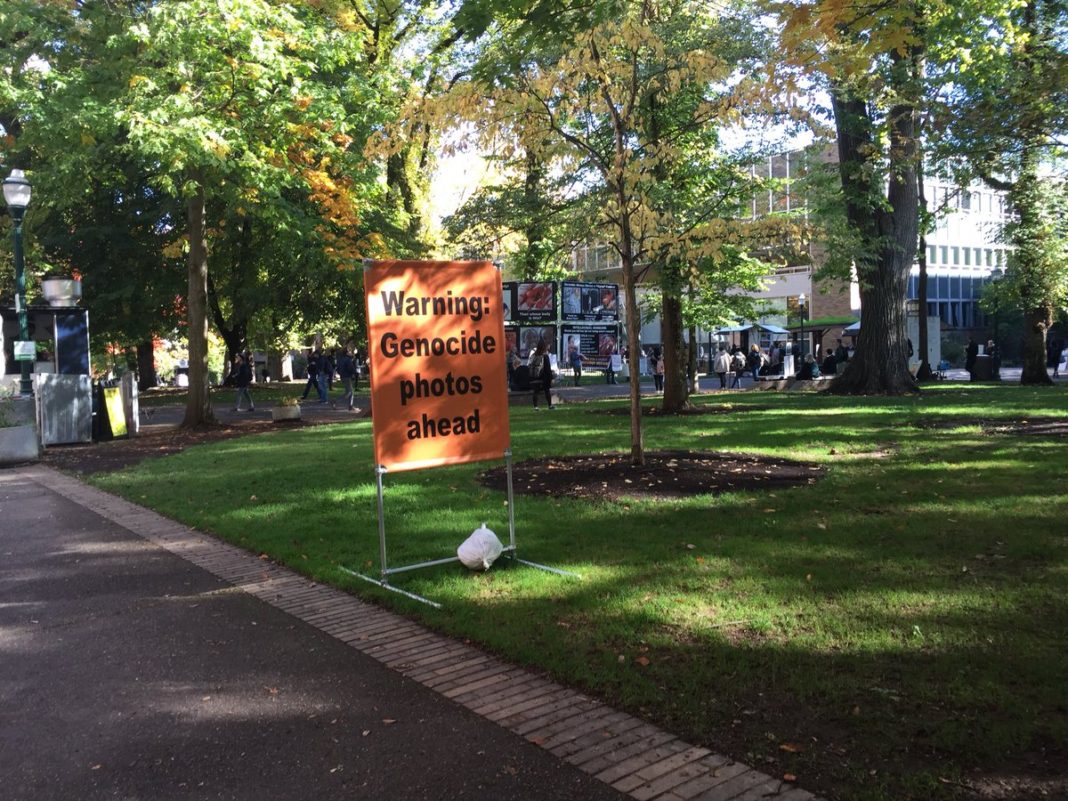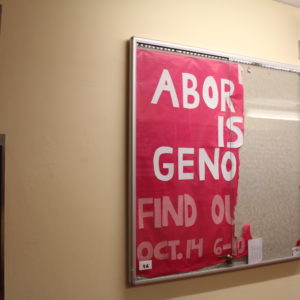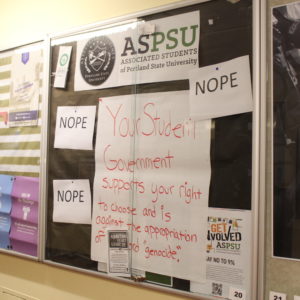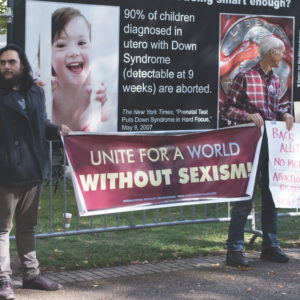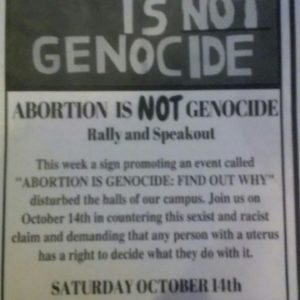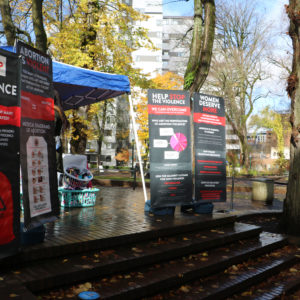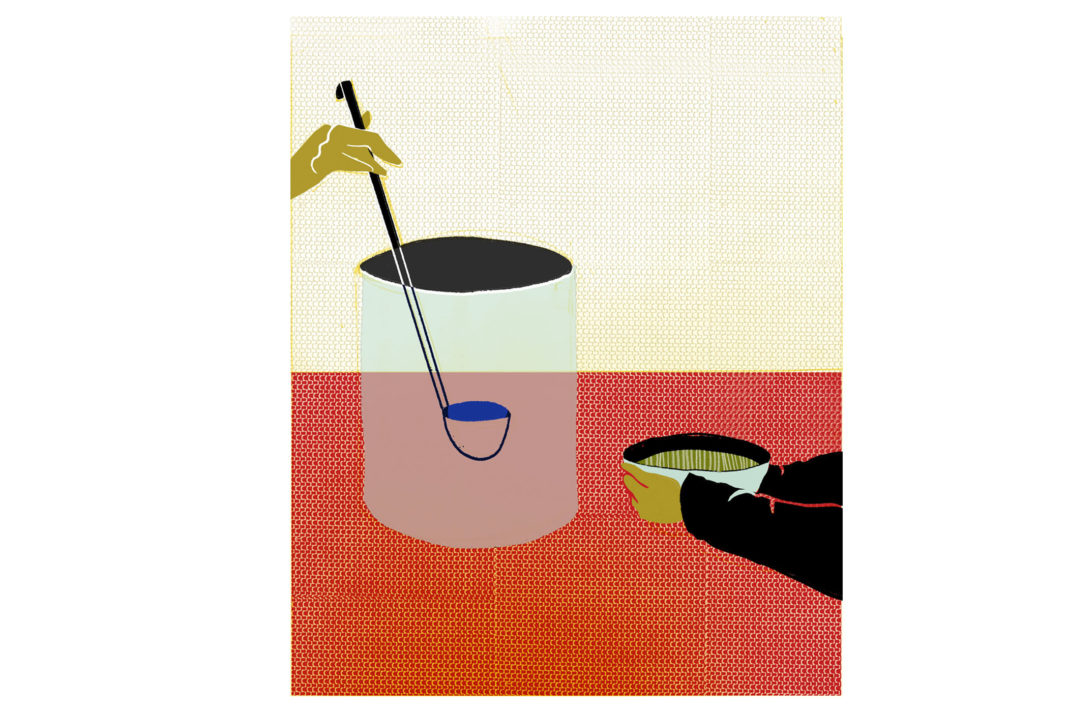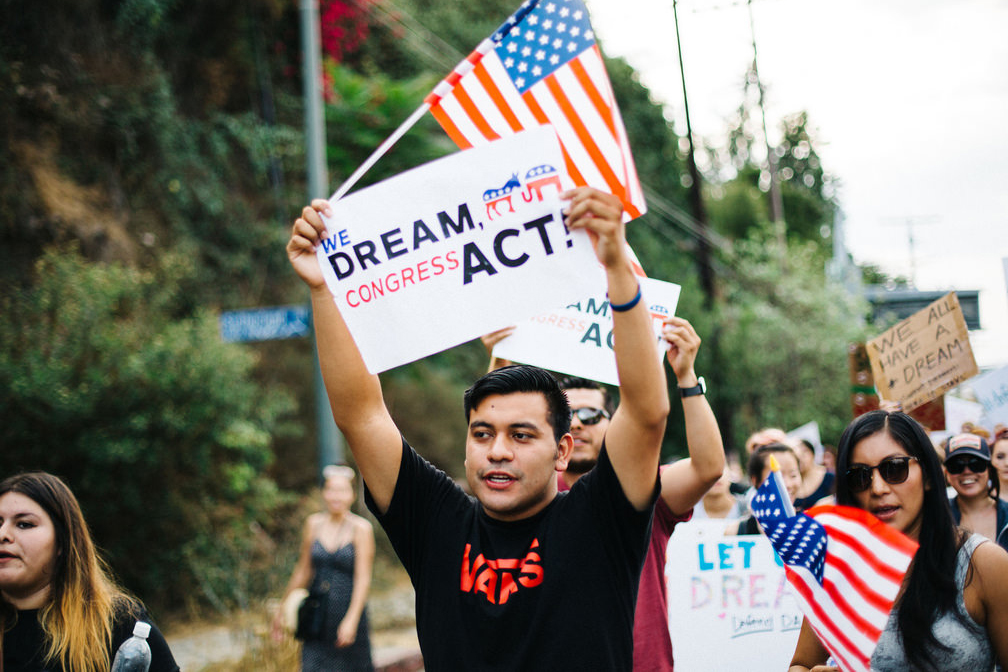Students walking through the Portland State Park Blocks on Oct. 16 were greeted with bright orange signs that read, ‘Warning: Genocide photos ahead.’
Representatives from the Center for Bio-Ethical Reform, brought to campus by the PSU Pro-life student group, erected a two-story graphic display of aborted fetuses, piles of bodies from Nazi concentration camps, and lynchings in front of Smith Memorial Student Union.
Anti-abortion advocates sequestered themselves inside a circle of steel barricades as students and passersby protested and engaged in conversation with the anti-abortion demonstrators.
In Shut it Down, Joe Michael Riedl’s second podcast episode with Vanguard, Riedl hears from anti-abortion demonstrators, the students who protested and PSU faculty charged with protecting students’ right to bring this graphic display to campus.
On Nov, 17, PSU Pro-life brought a public anti-abortion demonstration to campus for the second time during Fall term, this time with slightly less graphic imagery.
Shut it Down was created and produced by Joe Michael Riedl, in partnership with PSU Vanguard, with help from Vanguard Editor-in-Chief Colleen Leary and Multimedia Editor Danielle Horn.
Episode 2: “Shut it Down” Transcript
Joe Michael Riedl: Severely graphic images of mutilated fetuses stood 20 feet tall in the Park Blocks mid-October. It was a part of the Genocide Awareness Project and they were visiting from California with a clear message.
Jackie: “We show that abortion decapitates and dismembers tiny human beings.”
JMR: That’s Jackie, and she explained to me that they’re a secular group fighting for equity among all people, including fetuses.
Jackie: “Once the sperm hits the egg, you have a separate, whole, living human being. That’s embryology, that’s science, that’s biology and therefore they deserve equal protection under the law because they are on equal footing with every other person of the human race.”
JMR: Among counter protesters was a man named Hanna. He held a big sign that just said “lies.” He pointed me toward his companions with the PSU International Socialist Organization. They had pamphlets rebutting Jackie’s claim.
Hanna: “We have fact sheets over there about when fetuses can begin to feel or even have any sort of sensation that a human has, but until that point, it is a bundle of cells.”
JMR: Opposing sides conversed back and forth for hours, some asking questions, others correcting facts, and a lot of yelling.
What was interesting to me that day wasn’t what I heard, but what I saw. On the posters, next to bloodied fetuses, were images of the Holocaust along with photos of Black Americans hung by their necks.
These images sparked anger—deep-down, visceral—manifested in the shouts of onlookers.
Onlookers:
“No, it’s not, it’s someone’s choice! It’s someone’s choice to have an abortion. It’s their right over their own body.”
“It was the Nazi’s choice, it was Pol Pot’s choice. That’s not saying it’s right.”
“This is so offensive.”
JMR: It was a main point for counter-protesters; the thought, to them, of comparing people who have had abortions to Nazis, was horribly wrong. Here’s Hanna again:
Hanna: “They’re making false equivalencies to the Holocaust and to the lynching of Black Americans in this country. They’re comparing women having bodily autonomy and the ability to make choices with their bodies to genocide that was driven by, in the case of the Holocaust, fascist ideology and, in the case of Black Americans being lynched, white supremacy.”
JMR: But for the members of the Genocide Awareness Project, genocide is synonymous with abortion. Their display is meant to show that. Jackie showed me a photo of a baby on the display toward the end of our conversation.
Jackie: “That’s her mom. Her mom saw these pictures and she’s alive today because of that. If one baby is saved, all of this is worth it. No matter how much we get screamed at, no matter how much we have to stand in the elements, if one baby gets saved—we’ve seen it happen time and time again, she’s not the only one here because of these pictures—it’s all worth it.”
JMR: Backlash came quickly. First, in a fundraiser for Portland State’s Women’s Resource Center and Planned Parenthood. Advocates collected money directly in front of the massive posters and reportedly raised more than a thousand dollars. Second, in hundreds of emails and in-person meetings with PSU’s Student Activities and Leadership Program.
Aimee Shattuck is the Assistant Dean of Student Life and Director of SALP. She said that the process for setting up the event was pretty standard. It was put on by PSU Pro-Life, a student organization.
Aimee Shattuck: “I’ve gone through this a number of times. They put in the request for the Park Blocks, did the security meetings, and they coordinated with the national group to come.”
She explained to me that as an employee of a public institution, she’s obligated to uphold the [United States] Constitution.
AS: “We are not able, or willing, per the Constitution of the United States and Supreme Court rulings to make decisions on who we recognize as a student group based on content or mission or their values, so it has to be viewpoint-neutral.”
JMR: That is, PSU Pro-Life had just as much of a right to organize the event as any other student organization.
A number of people wandered into the SALP office wanting to know why they let this happen, some even wanting them to shut the event down.
AS: “We’re a public institution; that means that I am technically a government official. And so by asking me to go shut down an event or content that’s disturbing and disgusting and that people don’t like, you’re asking a government official to go shut down content. And that is a very scary path to start walking down.”
JMR: Shutting down speeches and events on college campuses is a trend all across the nation.
It’s a road Shattuck doesn’t want to walk down, and that’s what she discussed with those outraged by what they saw that day. She talked to them about the history of free speech on college campuses.
AS: “In the sixties at Berkeley [College], students sat in their cars for a week, they chained themselves to desks, there were massive riots so they would have first amendment rights—that was college students, and they were directly trying to get free speech rights to criticize the administration of the university and to be able to have protests about the Vietnam War.
“[At] Kent state, students had the right to assemble and protest the Vietnam war, and the National Guard came and killed university students who were peacefully protesting. I don’t want that to be our reality.”
JMR: Outside of Portland State, she’s an activist herself. Her fight is for women’s rights.
AS: “I’ve done activism work around abortion rights. I’ve been the coordinator of the Women’s Resource Center. This year, I had a fundraiser for Planned Parenthood outside of work in my own personal time, so clearly I don’t agree with the content, however, they deserve the right. They have the right to be here on campus. I’m not going to trample on somebody’s First Amendment rights.
“To shut down speech that you don’t like because you’re opposed to it, because it’s gross, because it’s counter to what you believe in is saying you yourself don’t deserve First Amendment rights, and under our current government situation, I don’t want to give up that right. I want to fight for that right even if that means fighting for that same right for people I disagree with.”
JMR: Rather than try to shut the event down, she gave advice to those angry about the comparison of abortion to genocide.
AS: “This is the perfect opportunity to go out there and talk to all those people that are mad about it and get them to do something. There’s so much energy right now around this particular topic; harness it. Don’t waste your time talking to me—I’m not shutting it down—you will be getting nowhere, so go out there and do something.
The thing that I would like to see is activists really taking time to think about strategy and tactics—understanding their own rights, their civil liberties, understanding the law, using it, being coordinated, educating one another.”
JMR: Free speech, specifically on college campuses, and especially now, when hateful rhetoric is becoming the norm, is changing in an unforeseeable way. There seems to be a clear, polar division, and the way we decide to go will massively influence the next generation, as did the free speech movement 50 years ago.
As for Aimee, she’s not sure about where specifically to go from here. But whatever the case, she hopes our options remain open.
AS: “It’s not just on college campuses, this is nationwide, as a whole culture, as a society, we’re dealing with this, where it just feels like there’s no resolution. And I hope that we respond in a way that doesn’t limit our ability to respond in the future.”

